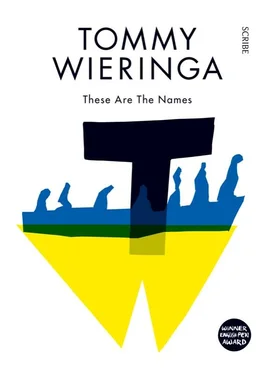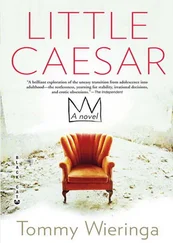This was the information at a glance. Then he fell onto the sand. From the corner of his eye he saw a chunk of stone, and the blackened blood. He tried to scramble to his feet, but the ground was pulled out from under him as though it were a carpet.
Gasping for breath, he crawled away from the dead man. His heartbeat rang in his ears. They had got him — Africa! The word reverberated loudly inside him, as though he was hearing it for the first time. No one had travelled as far as he had! His head, now crushed by a stone. Dawn had brought the crime to light.
He, of all people, had been the one to find him. No one but him. Once again, that mysterious knowledge of being elected!
The others had risen and were getting ready to leave. The boy appeared from the plumed grass and came to stand beside them. He squared his shoulders, and said in his deepest voice: ‘Africa’s dead.’ He pointed back over his shoulder. ‘Someone finished him off.’
The poacher and the man from Ashkhabad looked at him and at each other by turns; the woman fell to her knees and shouted with joy, ‘God be praised!’
Vitaly sat on the ground, his teeth chattering. His forehead gleamed. His upper body swayed back and forth, as though he were listening to distant music.
‘Didn’t you hear him?’ the woman said. ‘The black man is dead.’
Vitaly rubbed a pinch of sand between thumb and index finger.
‘God bless the hand that killed him,’ the woman shouted.
Vitaly’s eyes shot nervously back and forth. He licked his lips with his white tongue. He was in a place where no one could follow anymore. In his weakness, the boy detested him more than ever.
He led the men to the spot where he had found Africa. The flies were awake, the scouts in their gleaming corselets. They crawled into his eye socket and walked across the torn eyeball; it made you itch. It would not be long before the black man was covered in a buzzing carpet of flies. The man from Ashkhabad picked up the stone and looked at it. None of them said a world. They left the corpse alone. This was a different kind of dead.
The woman had come up behind them. The boy heard her snort loudly. She spat on the dead body, white gobs flying from her dirt-smeared lips. She kicked at him; his corpse shuddered. ‘Ape!’ she panted as she kicked. ‘Filthy ape!’
This is the first time she’s ever touched him, the boy thought.
The poacher pulled her away, but she kept kicking at thin air. ‘That’s enough!’ the poacher said. ‘He can’t hurt anyone anymore!’
She stopped moving in his grasp. ‘Burn him,’ she said. ‘Make sure he never comes back.’
The poacher gave her a shove, sending her back in the direction she had come from. ‘With what? With sand and grass? Are you out of your mind, woman?’
The man from Ashkhabad was not distracted by the fuss. He never stopped looking at the dead man. He took in the tattered rags, the dull, black skin — his gaze wandered along the trail of scars on his arms and chest, the wizened neck and grimy beard, and on to his ruined face.
Oh, loathsome flies. He scratched red furrows in his neck and breastbone. His whole life long he had been swatting flies away from his face, his hands, and his ankles, but then one day they finally claimed the body they had been tasting for so long. He squatted and put the stone down beside him. Slowly he reached out to the black man’s chest and pulled the cord from under his shirt. He took the little cross that had slid into the man’s armpit, and dangled it between thumb and forefinger. The crossbeam was attached in the middle. The wood was oiled with body fat. It was tooled; if you looked carefully, you could see a sort of interlacing pattern, almost obliterated now by the friction between shirt and skin.
He had once seen the black man kiss this cross. It was a pious ape he had seen. It had insulted him. God was not for donkeys and dogs and apes.
Little remained of his distaste now. He rubbed his thumb over the grooved wood. In the same way he used his stick, so had the black man worn his cross, holding it up to ward off disaster.
What were the differences between them again? He couldn’t remember. It had to be there, that bottomless difference, but his hands clutched at air. Now that the delusions had lifted, he saw only how alike they had been in their suffering and despair.
He laid the cross back against the man’s chest. What good were such thoughts when you’d had no experience with them before? He used his arms to push himself to his feet. The boy had been staring at him all this time. Maybe he understood what he was thinking. Maybe he could tell him what these thoughts were supposed to mean.
They moved on through the day that never grew light, each with his own thoughts about the black man they were leaving behind on the plain. One of them had crushed his skull. The others imagined how that had gone. How the killer had snuck through the grass, heel-toe, heel-toe, to keep from making a sound, the stone in his hand, how he had raised his arm.
Sacrificed himself. Set them free.
The following straggler was revealed now. They heard a faint lamentation at their backs, sometimes punctuated by raging monologues. Vitaly was being visited by his demons. Deep within him, a primal force was spurring him on to follow the others, but the shades around him had already begun pulling him back into his past. Their grip was stronger all the time; he fell further behind his companions all the time. Their pace slackened nonetheless. Vitaly had never given any cause for compassion; an act of charity would be lost on him. They would leave him behind and forget him as quickly as possible.
The wind stirred; rain fell, too. The woman stuffed her mouth with dirt. Her jaws ground slowly. The boy walked as far from her as he could, in order not to see how she devoured bite after bite of earth, her eyes as blank as a blind woman’s.
Far away, where honey-yellow light fell from behind the clouds, tumbleweed danced across the earth’s surface — translucent balls of thistle and kali, driven by the wind. High as a house, the wheels rolled slowly across the steppe, a series of slow-motion, dream-like images. The travellers’ hearts leapt whenever one hopped into the air and was then chased away. They reached out their hands to touch them, but one by one the rollers vanished from sight and left behind a yearning. Where were those wheels rolling to so light-heartedly, so far away in that yellow light?
But before evening comes, the travellers’ head are once again bowed to the earth. The eternal repetition has rocked them to sleep. The nimble dance of the tumbleweeds is forgotten. Everything is forgotten.
CHAPTER TWENTY-FIVE.Hunger
The first call came in early that evening: a woman complaining about drifters knocking over garbage cans in the street. Just before eight, there was a second one: another woman, weeping this time; the group of drifters she’d encountered had thrown her into a panic. ‘They’re the dead,’ she’d said.
Car 37 took the call. At a quarter past eight, patrolman Ivan Budnik turned into the street. Fucking transients, he thought. Give a couple of them a good thumping every once in a while — that’s all you can do.
Halfway down the street, between the flats, where the streetlights were dim, he caught them in his headlights. The glow from the rotating light reflected off them. His brain didn’t understand what his eyes were seeing: shadows, separated from their bodies. He had been planning to bark an order at them through the megaphone, but his breath caught in his throat. It was as though he saw tears glistening on their filthy cheeks. Weeping phantoms. Great God. Skin, lashed tightly around their bones, mummified almost. Black eye-sockets.
Читать дальше











